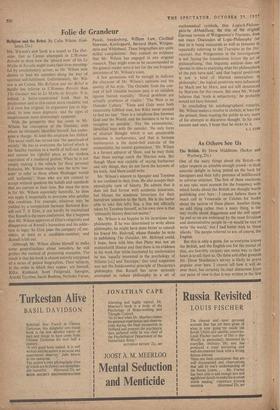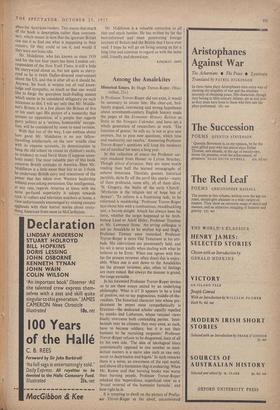As Others See Us
The British. By Drew Middleton. (Seeker and Warburg, 25s.) ONE of the nasty things about the British—in other respects an amiable enough crowd—is their neurotic delight in being patted on the back by foreigners and their lofty pretence of indifference to adverse criticism. The first of these reactions, at any rate, must account for the frequency with which books about the British are thought worth publishing over here: I cannot believe there is much call in Venezuela or Celebes for books about the natives of those places. Another thing, an odd thing rather than a nasty thing, is the way myths about doggedness and the stiff upper lip and so on are embraced by the most frivolous and demonstrative people in—it would be nice to write 'the world,' but I had better stick to 'these islands.' The people referred to are, of course, the English.
But this is only a game, for as everyone knows the British, and the English too for the matter of that, are horribly various; one more way to their heart is to tell them so. On these and other grounds Mr. Drew Middleton's survey is likely to prove popular over here. I cannot tell how it will do over there, but certainly its chief distinction from our point of view is that it was written in the first
place for American readers. This means that much of the book is description rather than commen- tary, which means in turn that the ignorant British can use it to find out what is happening in their country. Or they could so use it, and would if they were not bone idle.
Mr. Middleton, who has known us since 1939 and for the last four years has been London cor- respondent of the New York Times, is still a little bit starry-eyed about us, but not quite as starry- eyed as he is (with Dulles-directed reservations) about the US, and this is after all as it should be. Anyway, his book is written out of real know- ledge and sympathy, so much so that one would like to forgo the querulous fault-finding session which seems to be considered obligatory on such occasions as thi. I will say only that Mr. Middle- ton's Britain is in a few places the Britain of five or ten years ago\. His picture of a monarchy that arouses no opposition, of a people that regards party politics as a 'serious, honourable' occupa- tion, will be considered by some to need revision.
With that but of the way, I can enthuse about how good Mr. Middleton is on our fellow- travelling intellectuals, on the 'new' Middle class with its expense accounts, its determination to hang the old school tie round its children's necks, its tendency to read Nevi! Shute (I suppose some- body must). The most valuable part of this book concerns British attitudes to America. Here Mr. Middleton is a little more than fair to us. I think he underrates British envy and resentment of the Power that has taken over Western leadership without even asking permission. Our intelligentsia, at any rate, regards America at times with the same po-faced superiority it adopts towards rock-'n'-rollers and television watchers at home, a view unfortunately encouraged by visiting campus eggheads with their horror stories about every- thing American from neon to McCarthyism. Mr. Middleton is a valuable corrective to All that and much besides. He has written by far the best-informed and most penetrating foreign account of Britain and the British that I have ever read. I hope he will go on living among us for a long time and continue to regard us with the same cold, friendly and shrewd.eye.
KINGSLEY AMIS



































 Previous page
Previous page